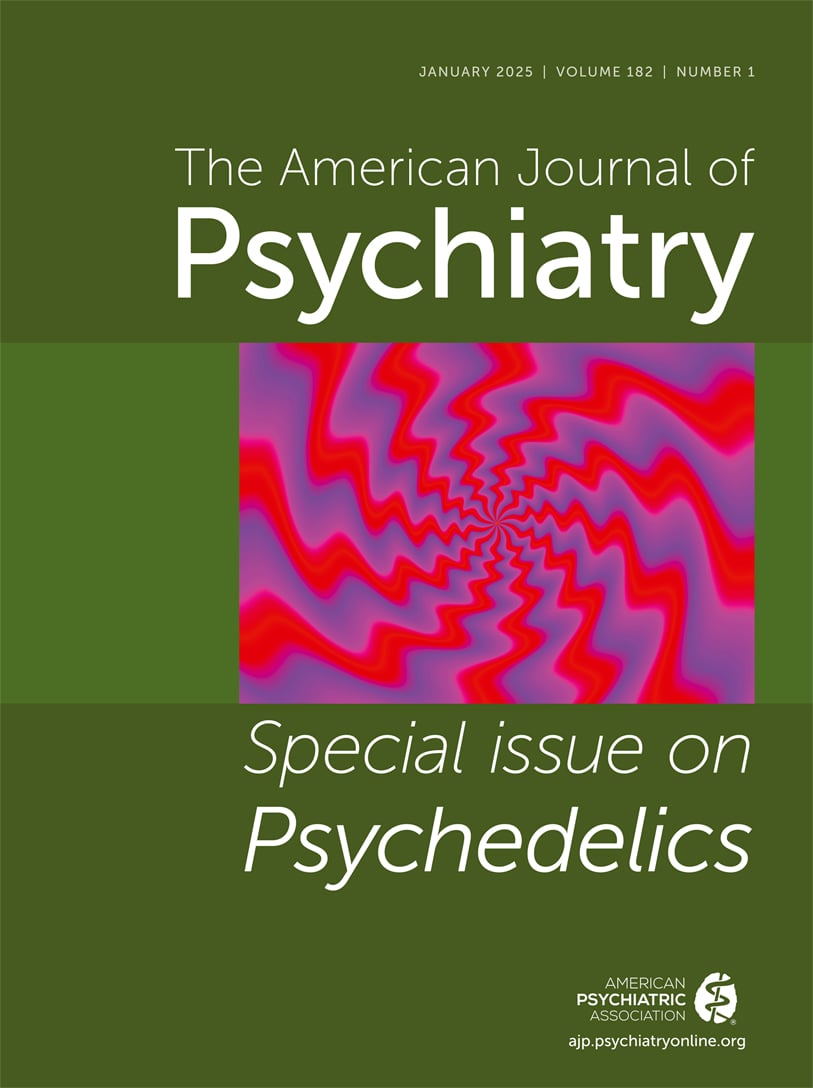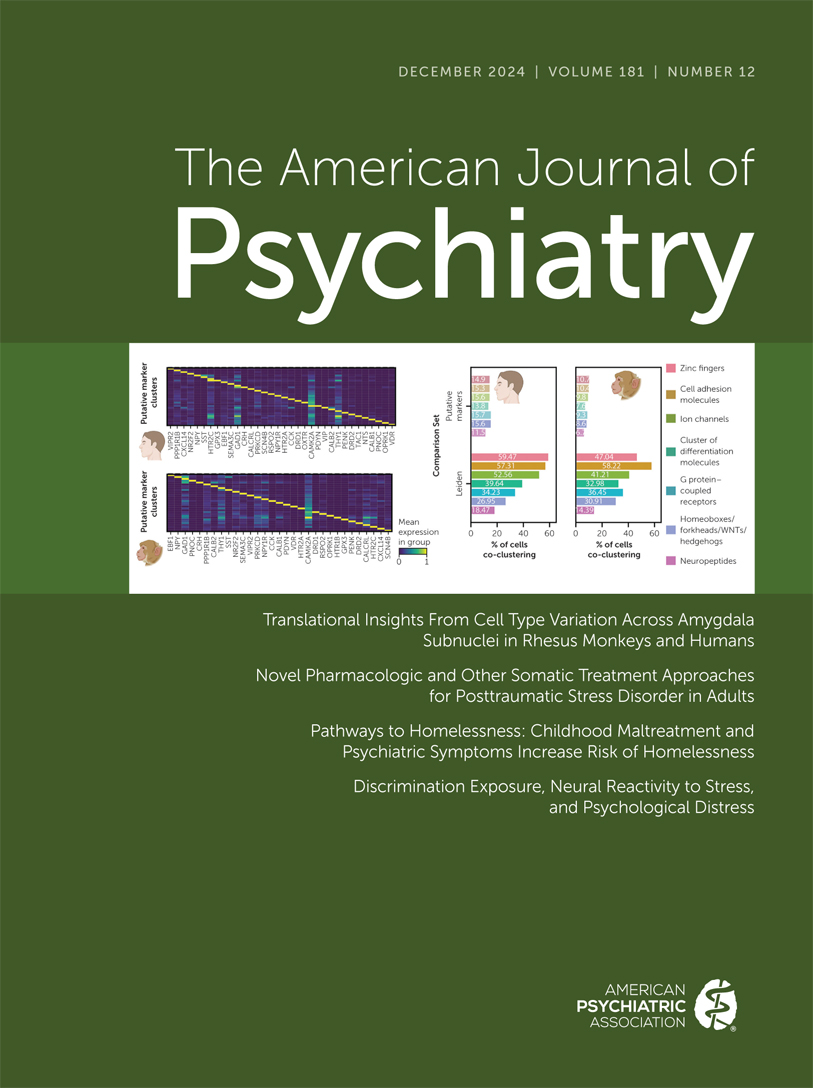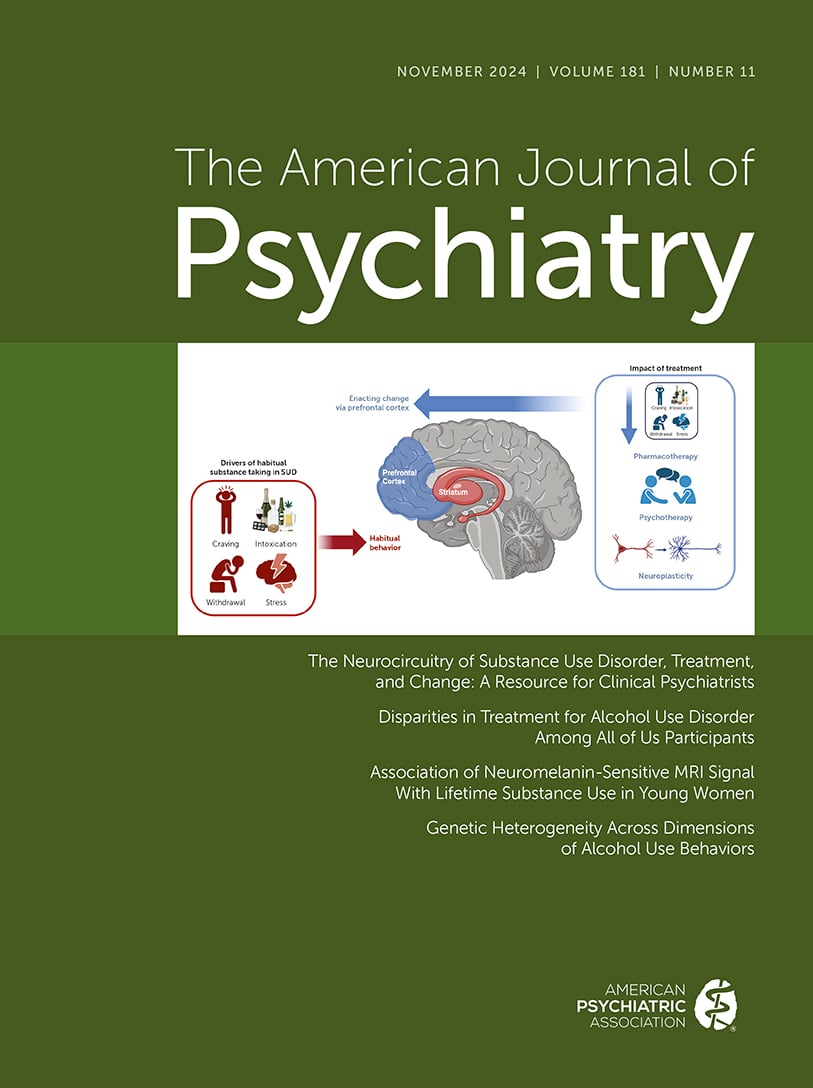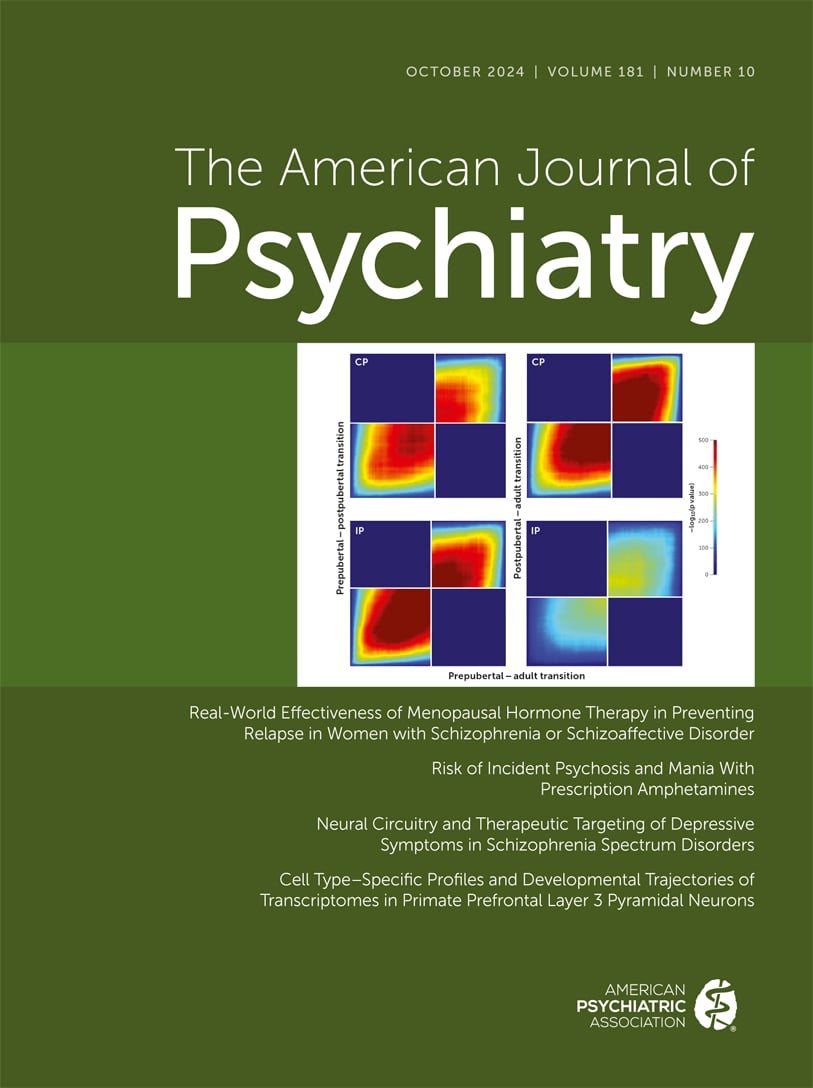American Journal of Psychiatry
- Volume 157
- Number 8
- August 2000
Editorial
Reviews and Overviews
Publication date: 01 August 2000
Pages1195–1203OBJECTIVE: Classification of the depressive disorders has long been controversial. The dominant current model is unitarian, with disorders largely distinguished on the basis of severity. Both the unitarian and the contrasting binarian views (of two ...
https://doi.org/10.1176/appi.ajp.157.8.1195Publication date: 01 August 2000
Pages1204–1211OBJECTIVE: The author sought to illustrate the invalidity of meta-analyses that claim to quantitatively compare the benefits of psychotherapy to pharmacotherapy in patients with psychiatric disorders. METHOD: Studies included in four meta-analyses were ...
https://doi.org/10.1176/appi.ajp.157.8.1204Images in Neuroscience
Introspections
Clinical Case Conference
Images in Psychiatry
Article
Publication date: 01 August 2000
Pages1221–1228OBJECTIVE: This study examined prospectively the effects of stressful events, depressive symptoms, social support, coping methods, and cortisol levels on progression of HIV-1 infection. METHOD: Eighty-two homosexual men with HIV type-1 infection without ...
https://doi.org/10.1176/appi.ajp.157.8.1221Publication date: 01 August 2000
Pages1229–1235OBJECTIVE: This study examined the experiential factors and interacting vulnerabilities that contribute to the development of posttraumatic stress disorder (PTSD) in children and adolescents. METHOD: Of 100 consecutive referrals to an inner-city child and ...
https://doi.org/10.1176/appi.ajp.157.8.1229Publication date: 01 August 2000
Pages1236–1242OBJECTIVE: The authors evaluated the neurohormonal and subjective mood response of children with anxiety disorders who were challenged with yohimbine. METHOD: Seventeen children with DSM-IV diagnoses of anxiety disorders and 15 normal comparison children ...
https://doi.org/10.1176/appi.ajp.157.8.1236Publication date: 01 August 2000
Pages1243–1251OBJECTIVE: Although previous evidence has suggested that the etiologic role of stressful life events in major depression is reduced in recurrent versus first-onset cases, this question deserves reexamination because of potential methodological limitations ...
https://doi.org/10.1176/appi.ajp.157.8.1243Publication date: 01 August 2000
Pages1252–1259OBJECTIVE: The study examined the association between cortisol and putative risk factors for posttraumatic stress disorder (PTSD) in a sample of subjects at increased risk for the development of PTSD. METHOD: Twenty-four-hour urinary cortisol excretion ...
https://doi.org/10.1176/appi.ajp.157.8.1252Longitudinal Study of Earthquake-Related PTSD in a Randomly Selected Community Sample in North China
Publication date: 01 August 2000
Pages1260–1266OBJECTIVE: This study longitudinally described rates of posttraumatic stress disorder (PTSD) in two groups with different levels of severity of exposure to an earthquake in North China. The effects of diagnostic criteria on the frequency of detected PTSD ...
https://doi.org/10.1176/appi.ajp.157.8.1260Publication date: 01 August 2000
Pages1267–1273OBJECTIVE: The authors examine patterns in utilization of psychiatric inpatient services by children and adolescents in general hospitals during 1988–1995. METHOD: National Hospital Discharge Survey data were used to describe utilization patterns for ...
https://doi.org/10.1176/appi.ajp.157.8.1267Publication date: 01 August 2000
Pages1274–1278OBJECTIVE: Employers are playing an increasingly influential role in determining the scope and character of health coverage in the United States. This study compares the health and disability costs of depressive illness with those of four other chronic ...
https://doi.org/10.1176/appi.ajp.157.8.1274Publication date: 01 August 2000
Pages1279–1284OBJECTIVE: This study was designed to determine whether hypnosis can modulate color perception. Such evidence would provide insight into the nature of hypnosis and its underlying mechanisms. METHOD: Eight highly hypnotizable subjects were asked to see a ...
https://doi.org/10.1176/appi.ajp.157.8.1279Publication date: 01 August 2000
Pages1285–1290OBJECTIVE: It has been reported that the human temperament dimensions of novelty seeking and harm avoidance are associated with polymorphisms in the D4 dopamine receptor gene (D4DR) and the serotonin-transporter-linked promoter region (5-HTTLPR), ...
https://doi.org/10.1176/appi.ajp.157.8.1285Publication date: 01 August 2000
Pages1291–1296OBJECTIVE: Muscle dysmorphia is a form of body dysmorphic disorder in which individuals develop a pathological preoccupation with their muscularity. METHOD: The authors interviewed 24 men with muscle dysmorphia and 30 normal comparison weightlifters, ...
https://doi.org/10.1176/appi.ajp.157.8.1291Publication date: 01 August 2000
Pages1297–1301OBJECTIVE: The authors tested the hypothesis that men in modern Western societies would desire to have a much leaner and more muscular body than the body they actually had or perceived themselves to have. METHOD: The height, weight, and body fat of ...
https://doi.org/10.1176/appi.ajp.157.8.1297Publication date: 01 August 2000
Pages1302–1308OBJECTIVE: The aim of this study was to discover clinically useful predictors of attrition and outcome in the treatment of bulimia nervosa with cognitive behavior therapy. METHOD: Pretreatment, course of treatment, and outcome data were gathered on 194 ...
https://doi.org/10.1176/appi.ajp.157.8.1302Publication date: 01 August 2000
Pages1309–1316OBJECTIVE: Impaired attention has frequently been observed in studies of unaffected siblings of patients with schizophrenia. To assess the suitability of impaired attention for use as an intermediate phenotype in genetic studies, the authors estimated the ...
https://doi.org/10.1176/appi.ajp.157.8.1309Publication date: 01 August 2000
Pages1317–1328OBJECTIVE: Cognitive adaptation training is a novel psychosocial treatment approach designed to improve adaptive functioning by using compensatory strategies in the home or work environment to bypass the cognitive deficits associated with schizophrenia. ...
https://doi.org/10.1176/appi.ajp.157.8.1317Brief Report
Publication date: 01 August 2000
Pages1324–1326OBJECTIVE: Little is known about the progression of cognitive deficits in older, community-dwelling patients with schizophrenia, especially in comparison to healthy subjects. METHOD: The authors examined the relationship of age to performance on the ...
https://doi.org/10.1176/appi.ajp.157.8.1324Publication date: 01 August 2000
Pages1327–1329OBJECTIVE: Schizophrenia may be associated with hyperthermic syndromes such as febrile catatonia, neuroleptic malignant syndrome, and heatstroke. The authors hypothesized that an exercise-heat tolerance test would disclose abnormal thermoregulation in ...
https://doi.org/10.1176/appi.ajp.157.8.1327Publication date: 01 August 2000
Pages1329–1331OBJECTIVE: N-methyl-d-aspartate (NMDA) receptor antagonists are known to produce a syndrome resembling schizophrenia, probably due to their blockade of NMDA receptors. The NMDA receptor 2B (NR2B) subunit has been identified as one of the major proteins in ...
https://doi.org/10.1176/appi.ajp.157.8.1329Publication date: 01 August 2000
Pages1332–1334OBJECTIVE: This was an investigation of whether treatment with fluoxetine is useful for individuals with bulimia nervosa who do not respond to psychotherapy or relapse afterward. METHOD: Twenty-two patients with bulimia nervosa who had not responded to, ...
https://doi.org/10.1176/appi.ajp.157.8.1332Publication date: 01 August 2000
Pages1334–1337OBJECTIVE: The primary objective of this investigation was to examine the acute antidepressant effects of intravenous hydrocortisone and ovine corticotropin releasing hormone (CRH) infusions in patients with major depression. METHOD: Twenty-two patients ...
https://doi.org/10.1176/appi.ajp.157.8.1334Publication date: 01 August 2000
Pages1337–1340OBJECTIVE: The authors determined the frequency of anxiety disorders in a large group of depressed outpatients seeking treatment. METHOD: The Structured Clinical Interview for DSM-IV was administered to 373 depressed outpatients. RESULTS: More than one-...
https://doi.org/10.1176/appi.ajp.157.8.1337Letter to the Editor
Book Forum: Textbook
Book Forum: Personal Accounts
Book Forum: Psychoanalysis
Book Forum: Childhood
Book Forum: Trauma and Dissociation
Correction
Past Issues
View Issues Archive
Vol. 182 | No. 1

Vol. 181 | No. 12

Vol. 181 | No. 11
